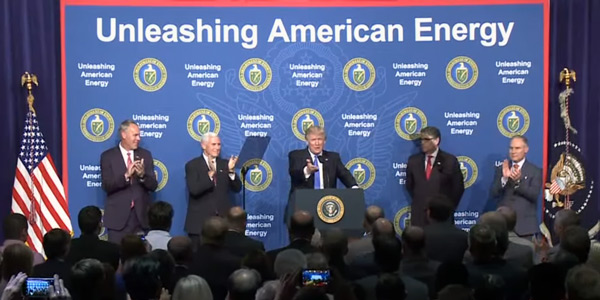Congress last week rejected President Trump’s proposal for deep spending cuts at EPA and the Department of Energy.
On Thursday, the Senate Appropriations Committee voted 30-1 to approve $38.4 billion in funding for the department and water programs, a $4 billion increase over the administration’s proposal.
The Advanced Research Projects Agency-Energy, which Trump had proposed eliminating, instead won $330 million, its highest ever. The department’s energy efficiency and renewable energy program received $1.94 billion; Trump would have slashed it to $740 million.
“This is an incredible demonstration of bipartisan support for energy-efficiency programs and for the value they deliver to American consumers and businesses,” said Kateri Callahan, president of The Alliance to Save Energy.
The Senate bill includes funding for an interim storage site for nuclear waste, but unlike the House of Representatives’ version, does not fund the restart of Yucca Mountain as a permanent repository.
The committee’s action came two days after the House Appropriations Committee voted 30-21 to approve a $31.4 billion funding bill for EPA, the Interior Department and other programs — $824 million less than current levels but $4.3 billion more than Trump had sought. EPA would see a $528 million cut, about 6.5%. Most Democrats opposed the bill.
On Wednesday, EPA Administrator Scott Pruitt said he agrees with a bipartisan House proposal to reject Trump’s plan to end spending on the Great Lakes Restoration Initiative. The House would authorize $300 million in fiscal 2018, maintaining the project’s current funding.
Ozone, Cybersecurity, Hydropower Bills Advance
Meanwhile, the full House approved two bills last week changing the federal government’s permitting and siting policies for oil and natural gas pipelines and four bills on hydropower, energy security and EPA’s ozone standards:
- The Promoting Cross-Border Energy Infrastructure Act (H.R. 2883) would eliminate the need for presidential approval for pipelines or electric transmission lines that cross a border with Canada or Mexico. It was cleared 254-175. It would end the State Department’s role in the process.
- The Promoting Interagency Coordination for Review of Natural Gas Pipelines Act (H.R. 2910), approved 248-179, would make FERC the lead agency for approving interstate pipelines and require other agencies to conduct simultaneous reviews. Of the hundreds of pipelines FERC has reviewed in the last 30 years, it has only rejected two, the Center for Public Integrity and StateImpact Pennsylvania reported last week.
- The Ozone Standards Implementation Act of 2017 (H.R. 806) would give states flexibility in implementing National Ambient Air Quality Standards for ground-level ozone. It passed 229-199. The National Parks Conservation Association opposed the bill, saying it would allow companies seeking air pollution permits to ignore new ground-level ozone (smog) health standards for 10 years.
- The House voted 420-2 to amend the Federal Power Act to streamline the federal review of qualifying conduit hydropower facilities (H.R. 2786). The bill eliminates the 5-MW cap on such projects and revises the time frame for an entity to contest whether its hydroelectric facility meets the qualifying criteria.
- Enhancing State Energy Security Planning and Emergency Preparedness Act of 2017 (H.R. 3050) would provide financial assistance to states for implementing and revising energy security plans. The state plans must include a risk assessment of energy infrastructure and cross-sector interdependencies, and address potential hazards to each energy sector or system, including physical and cyber threats. It passed by voice vote.
- H.R. 2828 would extend the deadline for beginning construction of the Enloe hydroelectric project on the Similkameen River about 3.5 miles northwest of the City of Oroville, in north-central Washington. It passed by voice vote.
In other action, the House Energy and Commerce Committee’s Digital Commerce and Consumer Protection subcommittee approved bipartisan legislation on self-driving cars by voice vote. The bill allows automakers to deploy up to 100,000 self-driving vehicles without meeting existing auto safety standards and prevents states from imposing rules on them.
Upton to Join Bipartisan Climate Group?
The former chair of the committee, Rep. Fred Upton (R-Mich.), said he may join the bipartisan Climate Solutions Caucus. Upton, now chair of the Subcommittee on Energy, was among 46 Republicans who voted last week to support the designation of climate change as a national security threat in the National Defense Authorization Act.
While these were welcome developments for those concerned about climate change, they were tempered by news that Trump plans to nominate coal lobbyist and former Senate aide Andrew Wheeler as EPA deputy administrator.
And Joel Clement, until recently the director of the Office of Policy Analysis at the Interior Department, claimed in an op-ed in The Washington Post that he was reassigned to a job in an accounting office for talking about the effects of climate change on Alaska Native communities. Clement, one of dozens of senior department officials reassigned to positions where they had no background, filed a whistleblower complaint with the U.S. Office of the Special Counsel.
Also last week, congressional Republicans said they will attempt to change the Endangered Species Act by allowing regulators to use economic costs to deny listing a species as threatened.
— Rich Heidorn Jr.






